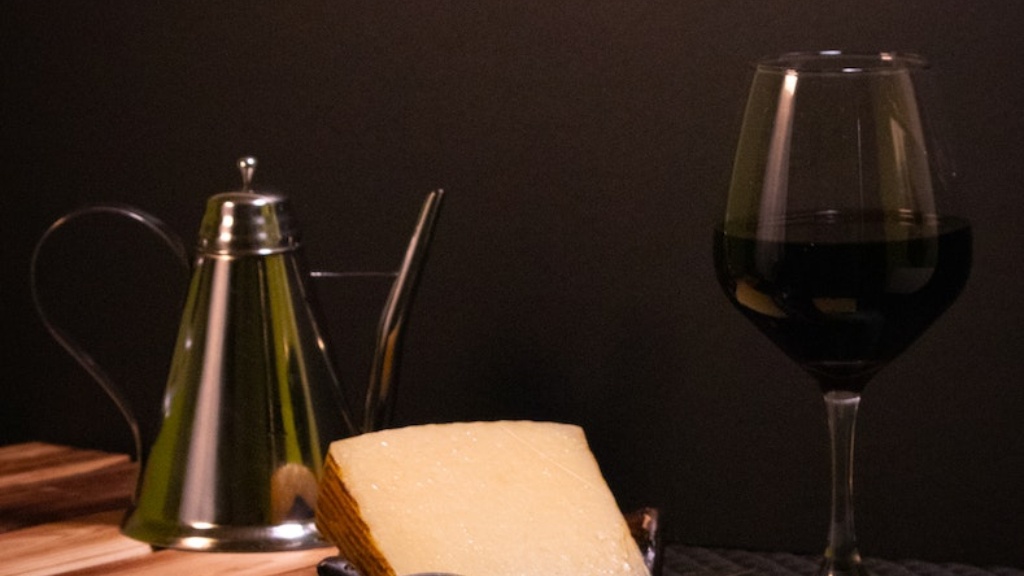Best Wine Bars In Paris, France
Paris, France is often referred to as the wine capital of the world, and with the abundance of wine bars throughout the city, it\'s not hard to see why. From cozy nooks hidden down alleyways

Paris, France is often referred to as the wine capital of the world, and with the abundance of wine bars throughout the city, it\’s not hard to see why. From cozy nooks hidden down alleyways to elegant bars with vast wine lists, Paris has something for every wine lover. Let\’s explore some of the best wine bars in Paris.
First on our list is La Cave à Michel, located in the 10th arrondissement. With a vast selection of natural wines, this cozy bar has a welcoming atmosphere perfect for a night of sipping and socializing. The knowledgeable staff is always on hand to recommend the perfect bottle for any palate.
Next up is Vantre, located in the 11th arrondissement. This hip and trendy bar boasts an impressive wine list with over 150 bottles of natural and organic wines. The open kitchen adds to the lively atmosphere, and the small plates are perfect for sharing among friends.
Le Barav, in the 3rd arrondissement, is a must-visit for any wine lover. This charming bar and wine shop offers over 350 bottles of natural wines from all over France. The friendly staff is always eager to share their knowledge and make recommendations based on individual tastes.
For a more upscale experience, head to Legrand Filles et Fils in the 2nd arrondissement. This elegant bar and wine shop has been a Parisian institution since 1880, and the extensive wine list is a testament to their expertise. The bar also doubles as a cellar, and guests are welcome to browse and purchase bottles to take home.
Located in the heart of the Marais, La Belle Hortense is a cozy and romantic wine bar perfect for a date night. The bar specializes in all things literary, with walls lined with books and regular author readings. The wine list is impressive, with over 100 bottles of mainly organic and biodynamic wines.
In the 6th arrondissement, La Dernière Goutte is a gem of a wine bar tucked away on a quiet side street. The bar offers a wide selection of natural and organic wines, with a focus on small, independent producers. The knowledgeable staff is always happy to make recommendations, and guests are welcome to sample before committing to a bottle.
Finally, we arrive at Aux Deux Amis in the 11th arrondissement. This lively and hip bar offers a relaxed atmosphere perfect for a casual evening with friends. The wine list is extensive, focusing mainly on natural and organic wines, and the food menu is comprised of small plates and charcuterie.
In conclusion, Paris is home to some of the best wine bars in the world, catering to every taste and budget. Whether you\’re a seasoned wine connoisseur or just beginning to explore the world of vin, these bars are sure to please. So grab a glass, sit back, and savor the flavors of France.
—
Expanding on the topic, let\’s dive deeper into the world of French wine.
France is known for producing some of the best wines in the world, and the country is divided into several wine regions, each with its own distinct terroir (the combination of soil, climate, and geography).
One of the most famous wine regions in France is Bordeaux, located in the southwest of the country. Bordeaux is known for producing full-bodied, complex red wines from grapes such as Cabernet Sauvignon and Merlot. The wines of Bordeaux are often aged in oak barrels, which adds to their complexity and richness.
Another famous wine region in France is Burgundy, located in eastern France. Burgundy is known for producing some of the world\’s finest Pinot Noir wines, as well as elegant Chardonnays. The region is characterized by its unique blend of limestone-rich soils and cool, continental climate.
The Loire Valley is another important wine region in France, known for producing crisp, refreshing wines such as Sauvignon Blanc and Chenin Blanc. The region is also home to some of the world\’s finest sparkling wines, known as Crémant de Loire.
Moving south, the Rhône Valley is known for producing rich, full-bodied red wines made from Syrah grapes. The region is divided into two parts: the northern Rhône and the southern Rhône. The northern Rhône is known for producing some of the world\’s best Syrah wines, while the southern Rhône is known for its blends, such as Châteauneuf-du-Pape.
Finally, Champagne is arguably the most famous French wine region, known for producing the world\’s finest sparkling wines. Only wines produced in the Champagne region can be called Champagne, and the production process involves a second fermentation in the bottle, which creates the distinctive bubbles and complexity.
In conclusion, French wine is a true art form, and the wine regions of France offer a diverse range of flavors and styles. Whether you prefer a full-bodied red or a crisp white, there is sure to be a French wine that satisfies your palate.
—
Continuing on the topic, let\’s explore the art of food and wine pairing.
In France, food and wine go hand in hand, and pairing the right wine with the right dish can elevate the dining experience to new heights. But with so many different types of food and wine to choose from, how do you know which pairings work best?
One classic pairing is red wine with steak. Rich, full-bodied red wines such as Cabernet Sauvignon or Bordeaux pair perfectly with a juicy steak, enhancing the flavors of both the meat and the wine.
For white wine lovers, Sauvignon Blanc is the perfect match for seafood dishes such as oysters or shrimp. The crisp acidity of the wine cuts through the richness of the seafood, creating a perfectly balanced pairing.
For spicy foods, such as Thai or Indian cuisine, a sweeter wine such as Riesling or Gewürztraminer is a great choice. The sweetness of the wine helps to balance the heat of the spices, creating a harmonious pairing.
In general, lighter wines such as Pinot Noir or Chardonnay pair well with lighter dishes such as salads or grilled vegetables, while heavier wines such as Merlot or Syrah pair well with heartier dishes such as stews or roasted meats.
In conclusion, food and wine pairing is an art form, and there are no hard and fast rules. The most important thing is to experiment and find pairings that you enjoy. So whether you prefer red or white, meat or seafood, there is sure to be a French wine that complements your favorite dishes.
—
Moving on, let\’s explore the world of natural wines.
Natural wines are a relatively new trend in the wine world, but they are rapidly gaining popularity. Natural wines are made with minimal intervention, meaning that the grapes are grown without the use of pesticides or herbicides, and the wine is made without the use of chemicals or additives.
The result is a wine that is often described as raw or unfiltered, with a unique flavor profile that reflects the terroir and climate of the vineyard. Natural wines can be red, white, or rosé, and can be made from a variety of grapes.
While natural wines can be a bit unpredictable and sometimes challenging to drink, they offer a unique and authentic taste of the terroir. Many wine bars in Paris specialize in natural wines, and sommeliers are often happy to recommend bottles to those willing to try something different.
In conclusion, natural wines are a fascinating trend in the wine world, offering a taste of the terroir that cannot be found in conventional wines. Whether you\’re a wine connoisseur or simply looking for a new experience, natural wines are definitely worth exploring.
—
Finally, let\’s explore the art of wine tasting.
Wine tasting is a fun and educational experience that allows you to explore the nuances and flavors of different wines. In Paris, many wine bars offer wine tasting events, where guests can sample a variety of wines and learn about the production process.
When tasting wine, it\’s important to examine the color, aroma, and taste of the wine. First, examine the color of the wine, which can tell you a lot about its age and flavor profile. Next, smell the wine, taking note of any aromas such as fruit, spices, or oak. Finally, take a sip, letting the wine linger on your tongue and allowing the flavors to fully develop.
When tasting multiple wines, it\’s important to cleanse your palate between tastings with crackers or bread. This helps to reset your taste buds and allows you to fully appreciate each wine.
In conclusion, wine tasting is a wonderful way to explore the diverse flavors and complexities of French wine. So whether you\’re a seasoned wine connoisseur or a beginner, a wine tasting event in Paris is definitely worth adding to your itinerary.
First on our list is La Cave à Michel, located in the 10th arrondissement. With a vast selection of natural wines, this cozy bar has a welcoming atmosphere perfect for a night of sipping and socializing. The knowledgeable staff is always on hand to recommend the perfect bottle for any palate.
Next up is Vantre, located in the 11th arrondissement. This hip and trendy bar boasts an impressive wine list with over 150 bottles of natural and organic wines. The open kitchen adds to the lively atmosphere, and the small plates are perfect for sharing among friends.
Le Barav, in the 3rd arrondissement, is a must-visit for any wine lover. This charming bar and wine shop offers over 350 bottles of natural wines from all over France. The friendly staff is always eager to share their knowledge and make recommendations based on individual tastes.
For a more upscale experience, head to Legrand Filles et Fils in the 2nd arrondissement. This elegant bar and wine shop has been a Parisian institution since 1880, and the extensive wine list is a testament to their expertise. The bar also doubles as a cellar, and guests are welcome to browse and purchase bottles to take home.
Located in the heart of the Marais, La Belle Hortense is a cozy and romantic wine bar perfect for a date night. The bar specializes in all things literary, with walls lined with books and regular author readings. The wine list is impressive, with over 100 bottles of mainly organic and biodynamic wines.
In the 6th arrondissement, La Dernière Goutte is a gem of a wine bar tucked away on a quiet side street. The bar offers a wide selection of natural and organic wines, with a focus on small, independent producers. The knowledgeable staff is always happy to make recommendations, and guests are welcome to sample before committing to a bottle.
Finally, we arrive at Aux Deux Amis in the 11th arrondissement. This lively and hip bar offers a relaxed atmosphere perfect for a casual evening with friends. The wine list is extensive, focusing mainly on natural and organic wines, and the food menu is comprised of small plates and charcuterie.
In conclusion, Paris is home to some of the best wine bars in the world, catering to every taste and budget. Whether you\’re a seasoned wine connoisseur or just beginning to explore the world of vin, these bars are sure to please. So grab a glass, sit back, and savor the flavors of France.
—
Expanding on the topic, let\’s dive deeper into the world of French wine.
France is known for producing some of the best wines in the world, and the country is divided into several wine regions, each with its own distinct terroir (the combination of soil, climate, and geography).
One of the most famous wine regions in France is Bordeaux, located in the southwest of the country. Bordeaux is known for producing full-bodied, complex red wines from grapes such as Cabernet Sauvignon and Merlot. The wines of Bordeaux are often aged in oak barrels, which adds to their complexity and richness.
Another famous wine region in France is Burgundy, located in eastern France. Burgundy is known for producing some of the world\’s finest Pinot Noir wines, as well as elegant Chardonnays. The region is characterized by its unique blend of limestone-rich soils and cool, continental climate.
The Loire Valley is another important wine region in France, known for producing crisp, refreshing wines such as Sauvignon Blanc and Chenin Blanc. The region is also home to some of the world\’s finest sparkling wines, known as Crémant de Loire.
Moving south, the Rhône Valley is known for producing rich, full-bodied red wines made from Syrah grapes. The region is divided into two parts: the northern Rhône and the southern Rhône. The northern Rhône is known for producing some of the world\’s best Syrah wines, while the southern Rhône is known for its blends, such as Châteauneuf-du-Pape.
Finally, Champagne is arguably the most famous French wine region, known for producing the world\’s finest sparkling wines. Only wines produced in the Champagne region can be called Champagne, and the production process involves a second fermentation in the bottle, which creates the distinctive bubbles and complexity.
In conclusion, French wine is a true art form, and the wine regions of France offer a diverse range of flavors and styles. Whether you prefer a full-bodied red or a crisp white, there is sure to be a French wine that satisfies your palate.
—
Continuing on the topic, let\’s explore the art of food and wine pairing.
In France, food and wine go hand in hand, and pairing the right wine with the right dish can elevate the dining experience to new heights. But with so many different types of food and wine to choose from, how do you know which pairings work best?
One classic pairing is red wine with steak. Rich, full-bodied red wines such as Cabernet Sauvignon or Bordeaux pair perfectly with a juicy steak, enhancing the flavors of both the meat and the wine.
For white wine lovers, Sauvignon Blanc is the perfect match for seafood dishes such as oysters or shrimp. The crisp acidity of the wine cuts through the richness of the seafood, creating a perfectly balanced pairing.
For spicy foods, such as Thai or Indian cuisine, a sweeter wine such as Riesling or Gewürztraminer is a great choice. The sweetness of the wine helps to balance the heat of the spices, creating a harmonious pairing.
In general, lighter wines such as Pinot Noir or Chardonnay pair well with lighter dishes such as salads or grilled vegetables, while heavier wines such as Merlot or Syrah pair well with heartier dishes such as stews or roasted meats.
In conclusion, food and wine pairing is an art form, and there are no hard and fast rules. The most important thing is to experiment and find pairings that you enjoy. So whether you prefer red or white, meat or seafood, there is sure to be a French wine that complements your favorite dishes.
—
Moving on, let\’s explore the world of natural wines.
Natural wines are a relatively new trend in the wine world, but they are rapidly gaining popularity. Natural wines are made with minimal intervention, meaning that the grapes are grown without the use of pesticides or herbicides, and the wine is made without the use of chemicals or additives.
The result is a wine that is often described as raw or unfiltered, with a unique flavor profile that reflects the terroir and climate of the vineyard. Natural wines can be red, white, or rosé, and can be made from a variety of grapes.
While natural wines can be a bit unpredictable and sometimes challenging to drink, they offer a unique and authentic taste of the terroir. Many wine bars in Paris specialize in natural wines, and sommeliers are often happy to recommend bottles to those willing to try something different.
In conclusion, natural wines are a fascinating trend in the wine world, offering a taste of the terroir that cannot be found in conventional wines. Whether you\’re a wine connoisseur or simply looking for a new experience, natural wines are definitely worth exploring.
—
Finally, let\’s explore the art of wine tasting.
Wine tasting is a fun and educational experience that allows you to explore the nuances and flavors of different wines. In Paris, many wine bars offer wine tasting events, where guests can sample a variety of wines and learn about the production process.
When tasting wine, it\’s important to examine the color, aroma, and taste of the wine. First, examine the color of the wine, which can tell you a lot about its age and flavor profile. Next, smell the wine, taking note of any aromas such as fruit, spices, or oak. Finally, take a sip, letting the wine linger on your tongue and allowing the flavors to fully develop.
When tasting multiple wines, it\’s important to cleanse your palate between tastings with crackers or bread. This helps to reset your taste buds and allows you to fully appreciate each wine.
In conclusion, wine tasting is a wonderful way to explore the diverse flavors and complexities of French wine. So whether you\’re a seasoned wine connoisseur or a beginner, a wine tasting event in Paris is definitely worth adding to your itinerary.

